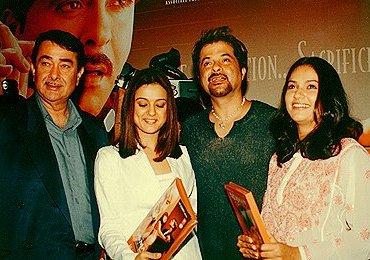Picture this: a young Indian girl brought up on Bollywood films and Indian TV and music. She sees the same faces and voices over and over again in almost everything she watches or hears.
But she doesn’t think anything of it. As she grows up, she looks at Western culture and sees a lot more faces (maybe less diversity, but that’s a different issue). She gets older and looks into the names behind her favourite Bollywood icons and her favourite Hollywood ones. The surnames repeat in Bollywood over and over again; some actors who once played kids play the grandparents or the side characters, but their own kids off screen are their kids onscreen too. But then she looks at Hollywood, and it’s much less common that a child and their parent are in the same industry.
This vision of Hollywood vs Bollywood was not only dry for me but for many other young brown/desi girls like me. We didn’t realise what was going on until we were exposed to the complete opposite. The root of this wasn’t just talent running in every single family we saw on screen. It was nepotism.
I was introduced to the word as a very young teenager by my uncle, who loves to use big words and then teach us what those big words mean when we look completely confuzzled. It confused me at the time because why wouldn’t someone use the resources around them to help them get where they want? Why was it so frowned upon?
Upon evaluation and research, just by existing in the spheres that I do, I realised two things:
Firstly, it wasn’t just a case of the odd parent helping their kid in the industry every so often. It was the richest family in India (for the purposes of this article, I am just going to address India – I don’t have enough information to weigh in anywhere else). Most families will adopt the ‘I scratch your back, you scratch my back’ theology; ‘Oh, you own this huge production company and want me to be your son’s agent? Sure.’ ‘Oh, hey, um, funny request… Do you know how you directed that film I was in 25 years ago? Well, I heard you’re casting for new dad-daughter roles for a for-sure blockbuster hit, and my daughter is desperate to get into the industry.’ These aren’t just standalone incidents in Bollywood/ Indian cinema, it’s everyday commonplace. In answer to the titular question, yes, it’s the catalyst, but for a faster legacy … rather than an easier one. Why isn’t it easy? Well, it boils down to my second realisation.
Often, these families don’t even WANT to be in the industry. It’s so common that members of families with famous industrial-facing relatives feel pressured in the shadow of these big characters or are just simply forced into the industry for fame, money, and an easy way to continue the legacy of one actor – passing it onto their child. This leads to huge problems in the mental health and enjoyment of these young actors, forcing them into a life they either didn’t choose, were blackmailed into choosing, or forced into the shadow of someone else. It’s not an easy legacy to uphold – to be unhappy in what should be the happiest job in the world.
It’s no secret to many people that the Bollywood industry is corrupted and full of backhand dealings and wrongdoings, and a huge factor behind this is plain nepotism. Across all levels of the industry, it is so common. It is not an easy legacy, and it is horrible for those budding artists that work so hard for roles or positions that aren’t offered to them because daddy and mummy’s money pays more than talent. It’s a sad reality behind a very happy mirage. I love Bollywood, don’t get me wrong, I was raised on the big dance numbers and the incredibly complicated storylines, but there is a sad truth behind it all. Yes, there’s a discussion about it now, yes there’s less now, and it’s becoming apparent that more people need to be offered the chance, but it isn’t fair on those who don’t want to be doing these things. I think it’s an important topic, and I’ve only touched the surface. I want to do more research, and I recommend looking into it!




